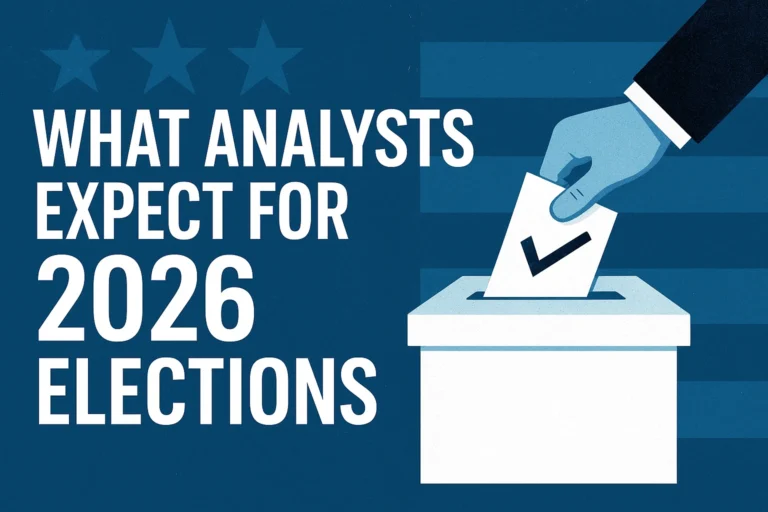Introduction
The year 2026 is set to be one of the most important election years in recent history. From the United States midterm elections to European Parliament contests and national votes in Asia, Africa, and Latin America, citizens worldwide will make choices that shape not only domestic policies but also global dynamics.
Unlike past election cycles, analysts emphasize that 2026 will not simply be about party lines or traditional political divides. Instead, the context is shaped by several converging factors:
- Rapid technological change (especially artificial intelligence, cybersecurity, and digital campaigning).
- Geopolitical uncertainty, with conflicts, alliances, and trade shifts redefining international relations.
- Climate and energy concerns, as voters demand solutions to extreme weather and energy security.
- Demographic change, with younger generations entering voting blocs in larger numbers than ever before.
This article explores what analysts expect for the 2026 elections across different regions of the world, examining the issues, trends, and risks likely to dominate the political landscape.
The United States Midterm Elections 2026
Analysts’ Outlook on Voter Engagement
The U.S. midterm elections in November 2026 are drawing global attention. Unlike presidential elections, midterms traditionally have lower turnout. However, analysts predict a potential surge in voter engagement in 2026, driven by:
- Expanding digital mobilization tools.
- Youth-driven activism on climate, student debt, and social justice.
- Polarization of key national debates, which may draw more voters to the polls.
Key Issues Shaping the Midterms
- Economy and Inflation
- Analysts expect the economy to remain the most significant issue for U.S. voters. Rising costs of living, housing affordability, and post-pandemic recovery measures are all expected to dominate campaign platforms.
- AI Regulation and Technology
- For the first time, analysts believe AI and digital governance will play a visible role in campaign debates. Concerns about automation, job security, and misinformation are prompting policymakers to propose new frameworks.
- Healthcare and Education
- Analysts expect healthcare affordability, student loan policy, and public education funding to resurface as defining topics.
- Climate and Energy
- Wildfires, extreme storms, and energy prices are pushing environmental policy into the center of voter discussions.
Election Technology and Trust
The integrity of U.S. elections has been a major issue in recent years. Analysts predict greater scrutiny of digital systems in 2026, with election authorities under pressure to secure voting infrastructure against cyberattacks and disinformation.
Europe: The 2026 Parliament and National Elections
The EU Parliament Vote
The 2026 European Parliament elections are expected to highlight some of the most pressing issues in European politics. Analysts foresee debates focused on:
- Energy Independence: The ongoing effort to reduce reliance on external energy suppliers.
- Digital Privacy and AI Regulation: Europe’s leadership in setting tech regulations will be tested.
- Migration and Security: Border policy and humanitarian debates will remain a flashpoint.
The Rise of Green and Populist Parties
Analysts note a likely increase in voter support for environmental parties, especially among younger Europeans. At the same time, populist and nationalist parties are gaining traction in countries experiencing economic stagnation or immigration tensions.
Individual National Elections
In addition to the EU-wide vote, several European nations will hold their own elections in 2026. Analysts expect these contests to:
- Reflect domestic economic concerns, such as inflation and unemployment.
- Test the resilience of coalition governments.
- Bring foreign policy stances particularly regarding relations with the U.S., Russia, and China into sharper focus.
Asia-Pacific Elections 2026
India
India, the world’s largest democracy, will hold national elections in 2026. Analysts expect these elections to be pivotal in determining the country’s trajectory on:
- Economic modernization and job creation.
- Technology adoption, AI, and digital infrastructure.
- Regional security issues with neighboring countries.
South Korea and Japan
In South Korea and Japan, elections are expected to revolve around:
- National security in light of regional tensions.
- Innovation-driven economies, particularly in semiconductors and AI.
- Demographic challenges such as aging populations.
Australia and Southeast Asia
In Australia, climate policy, trade, and immigration are likely to dominate electoral debates. In Southeast Asia, analysts note that elections will vary by nation, but recurring themes will include economic development and governance transparency.
Africa and Latin America: Emerging Trends
Africa
Several African nations will see elections in 2026. Analysts expect the main issues to revolve around:
- Governance and corruption.
- Access to technology and digital inclusion.
- Climate adaptation, as droughts and floods put pressure on infrastructure and agriculture.
Youth voters are increasingly shaping electoral outcomes across the continent, with rising expectations for transparency and accountability.
Latin America
In Latin America, elections in 2026 are expected to focus on:
- Economic stability amid inflation and debt pressures.
- Public security and crime reduction.
- Environmental stewardship, especially in countries with significant natural resources like Brazil.
Analysts anticipate more voters questioning traditional party structures, leading to a rise in independent candidates and new political movements.
Technology’s Role in the 2026 Elections
AI in Campaigning
READ MORE: AI Tools and Predictions in 2026
Analysts agree that 2026 will mark the full-scale integration of AI into political campaigns. From voter data analysis to personalized messaging, campaigns will leverage AI to improve outreach efficiency.
The Threat of Deepfakes and Disinformation
With these tools comes risk. Analysts warn of AI-generated misinformation deepfake videos, synthetic audio, and automated disinformation campaigns that could mislead voters.
Election Security
Cybersecurity experts predict an increase in attempted hacks on election infrastructure. As a result, governments are expected to prioritize robust defenses, international cooperation, and transparency in vote counting.
READ MORE: How to Register to Vote in 2026
Voter Demographics and the Rise of Activism
Youth-Led Movements
One of the most notable shifts for 2026 will be the influence of Gen Z and younger millennials. These groups are heavily engaged in activism related to:
- Climate change.
- Digital rights and online freedoms.
- Economic inequality.
Analysts expect their participation to be more organized and influential than in previous elections, potentially altering outcomes in tight races.
Grassroots Campaigning
Beyond social media, analysts expect traditional grassroots activism door-to-door canvassing, community events, and local organizing to see renewed emphasis, particularly as trust in digital platforms wavers.
Global Risks and Challenges
READ MORE: Top Careers to Study for in 2026
Cyber Threats
Election systems remain vulnerable to external interference. Analysts believe international cooperation will be critical to safeguard democratic processes.
Polarization and Social Division
Analysts caution that 2026 elections could deepen societal divides if leaders fail to address polarization.
Disinformation Fatigue
Voters face an unprecedented volume of information. Analysts warn that voter fatigue and distrust may become significant hurdles in maintaining healthy democracies.
Regulatory and Ethical Considerations
- AI Regulation: Governments are expected to adopt stricter policies on AI in campaigning.
- Data Protection: Analysts emphasize the need for stronger rules around voter data privacy.
- Election Oversight: International bodies may be called upon to provide neutral monitoring in contested elections.
The Future of Elections Beyond 2026
Analysts agree that elections in 2026 represent more than just a snapshot in time. They highlight:
- The long-term impact of AI and digital tools on democratic processes.
- The importance of civic education to prepare voters for navigating misinformation.
- The balance between tradition and technology preserving transparency and trust while embracing innovation.
Conclusion
Analysts do not make predictions about winners or outcomes. Instead, they emphasize that 2026 elections will be defined by shifting power dynamics, voter demographics, and the transformative role of technology.
From the U.S. to Europe, Asia, Africa, and Latin America, elections in 2026 will test the resilience of democratic institutions while offering opportunities for innovation and civic participation.
For citizens, businesses, and governments alike, understanding these trends is not just about politics it’s about preparing for a world in which technology, society, and governance are increasingly interconnected.

